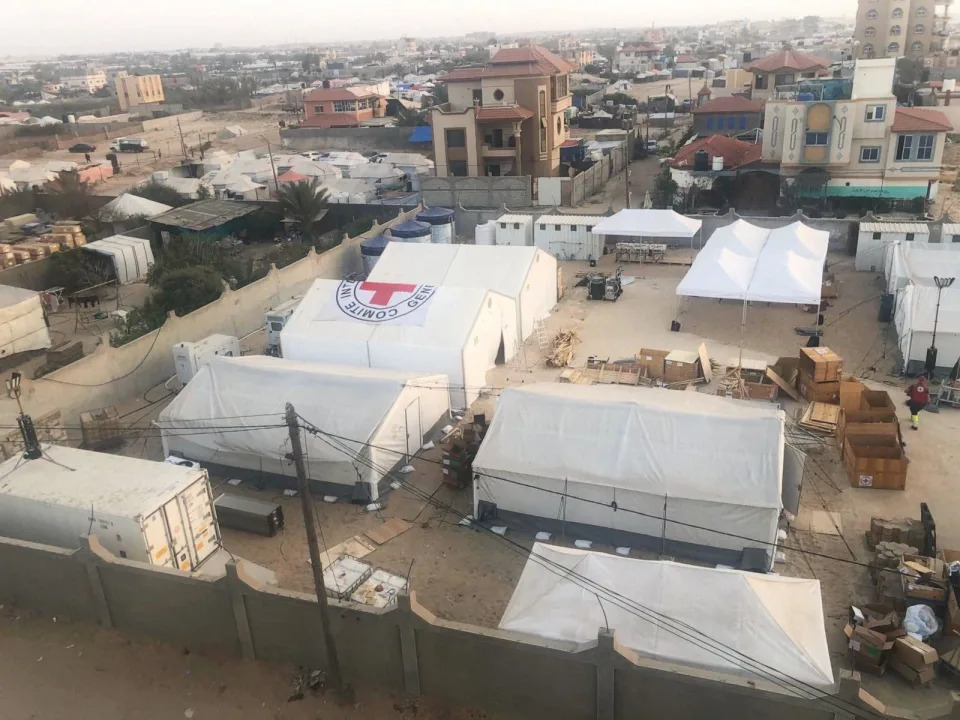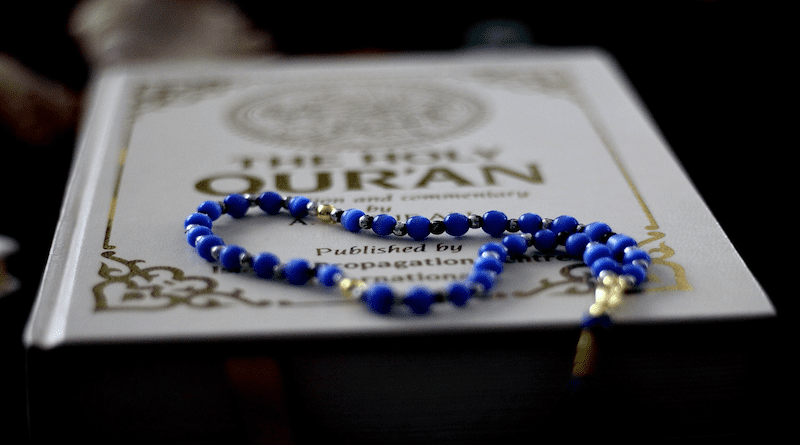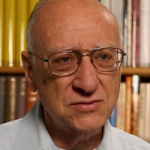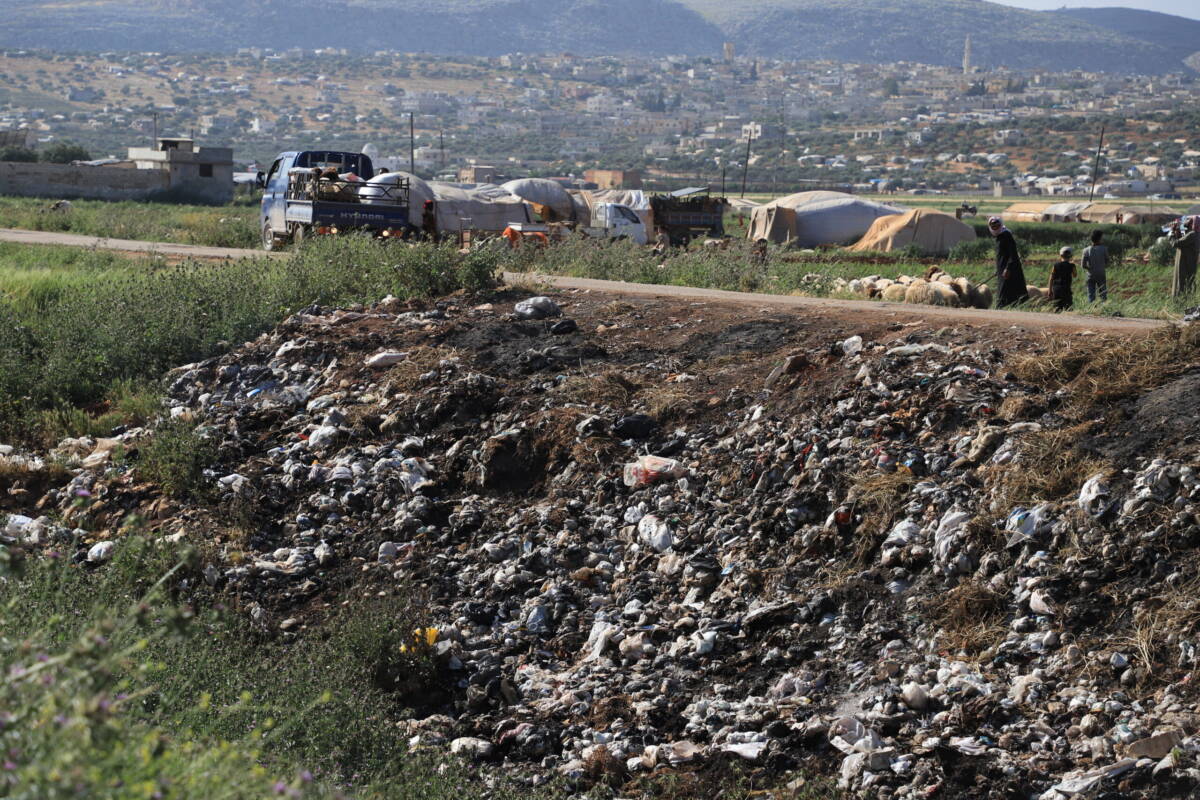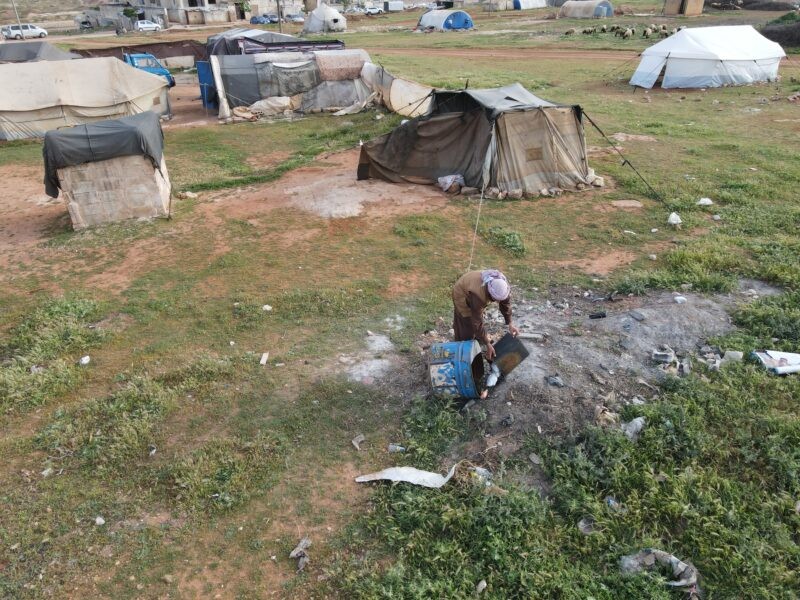Palestine’s Nakba has gone on for 76 years, but even in my nightmares, I never imagined the carnage currently unfolding.
By Michel Moushabeck ,
 Abdul Rahman Al-Helou, an 11-year-old Palestinian child, decorates the tent in which he and his displaced family live with lights for the holy month of Ramadan, on March 10, 2024, in Gaza, Palestine.SAHER ALGHORRA / MIDDLE EAST IMAGES / AFP VIA GETTY IMAGES
Abdul Rahman Al-Helou, an 11-year-old Palestinian child, decorates the tent in which he and his displaced family live with lights for the holy month of Ramadan, on March 10, 2024, in Gaza, Palestine.SAHER ALGHORRA / MIDDLE EAST IMAGES / AFP VIA GETTY IMAGESDid you know that Truthout is a nonprofit and independently funded by readers like you? If you value what we do, please support our work with a donation.
May 15, 1948, is a date forever etched in the collective memory of every Palestinian. We can’t forget what happened in the leadup to that fateful day. During that time, the world witnessed one of the largest forced migrations in modern history. Palestinians call this day “al-Nakba” — the catastrophe that resulted in the ethnic cleansing of nearly 750,000 natives and the destruction of more than 500 Palestinian villages and towns.
Seventy-six years ago today, the Jewish state of Israel was established and the Palestinian state of despair, homelessness, terror and daily suffering began. During the Nakba of 1948, my family was terrorized; they were displaced from their home in West Jerusalem and became refugees in countries that did not want them. I carry their pain with me to this day as I raise my voice in support of Palestinian rights.
Israeli historian and scholar Ilan Pappé wrote: “Palestine was not empty and the Jewish people had homelands; Palestine was colonized, not ‘redeemed;’ and its people were dispossessed in 1948, rather than leaving voluntarily. Colonized people, even under the U.N. Charter, have the right to struggle for their liberation … and the successful ending to such a struggle lies in the creation of a democratic state that includes all of its inhabitants.
Palestinians had nothing to do with the Holocaust and had no role whatsoever in the European pogroms. Before the start of large-scale European Jewish immigration of Holocaust victims to Palestine, 94 percent of the inhabitants of the land were Arabs. The number of Palestinian Jews — and, yes, they considered themselves Palestinians — in Palestine at the end of World War I was less than 60,000.
The Zionists could not have succeeded in colonizing Palestine if it weren’t for the support of Western imperial powers such as the United Kingdom and United States — two countries that did not want Jews in their midst and put strict restrictions on Jewish immigration.
RELATED STORY
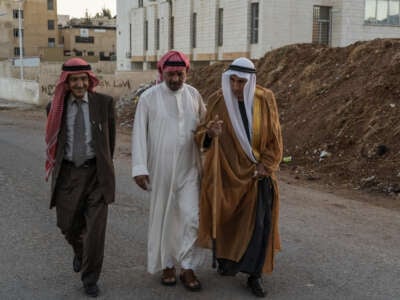
Genocide in Gaza Is Making Nakba Survivors Relive Their Own Ethnic Cleansing
Palestinian refugees in Amman, Jordan, who survived the 1948 Nakba, recount how it feels to watch this new Nakba unfold.
By Jaclynn Ashly , TRUTHOUTDecember 3, 2023
Palestinians had nothing to do with the Holocaust and had no role whatsoever in the European pogroms.
According to a recent piece by Harold Meyerson in The American Prospect, it was the enactment of the Johnson-Reed Act by the U.S. Congress on May 26, 1924, “fueled chiefly by white Protestant xenophobic fear and rage at Jews and Catholics flowing into the United States,” that left European Jews with no other choice but to go to Palestine. The Johnson-Reed Act is a federal law that prevented immigration from Eastern and Southern Europe in order to “preserve the ideal of U.S. homogeneity.” Meyerson explains:
Not surprisingly, it was only then that Jewish immigration to Palestine began to soar, particularly after the Nazis took power in Germany and antisemitic movements and governments came to dominate Poland, Hungary, and much of the rest of Eastern Europe. The 3 percent of Jewish emigrants from Europe who were going to Palestine before the U.S. closed off its border soared to 46 percent from 1932 to 1939, as the Nazis took over Germany and loomed as a threat over the rest of Europe.
The Jewish philosopher Hannah Arendt observed at the time that the European powers were attempting to deal with the crime carried out against Jews in Europe by committing another crime, one against Palestinians. She spoke out against it, since she felt it was a recipe for endless conflict. Zionist leaders, however, understood that they needed to ethnically cleanse the Palestinians in order to establish an exclusively Jewish homeland, and that the use of armed force against the Arab majority was essential for the colonial project to succeed.
More than seven decades later, Palestinians continue to be colonized; Palestinian lands continue to be confiscated for illegal settlement building; Palestinian family members continue to be separated from one another by walls; Palestinian communities continue to be forcibly displaced; Palestinian homes continue to be demolished; Palestinian farmers’ olive trees continue to be uprooted; Palestinian children continue to be terrorized, detained and killed by the IDF; Palestinian refugees continue to be exiled; and Palestinians living inside Israel continue to be discriminated against. With the complicity of its greatest ally, the United States, Israel has not only continued but has intensified its inhumane policies of apartheid and violations of international law.
Nakba Day is about resisting erasure; it is about reminding the world that Palestinians worldwide are determined to keep our struggle alive.
Nakba Day is about resisting erasure; it is about reminding the world that Palestinians worldwide are determined to keep our struggle alive. Its commemoration every year on May 15 serves as an important reminder that until there is an end to the occupation; until Palestinians get justice, freedom and equal rights; and until Israel adheres to international law, there can be no hope for peace.
Palestinians will also never forget Hamas’s October 7, 2023, attack on Israel and the ongoing atrocities that Israel has perpetrated in response. As I write, Israeli troops have moved into Rafah, the safe zone that 1.5 million displaced Palestinians were sent to after they were ordered to evacuate northern Gaza. More than 500,000 Palestinians are said to be fleeing Rafah amid Israeli bombardment from the air, land and sea, moving from one hell to the next. A massive humanitarian catastrophe is about to get even worse. This escalation is a direct result of the Biden administration’s unwillingness to end the genocide and its unconditional, “ironclad” support for Israeli actions, including its engineered starvation and forced displacement.
According to the Washington Post, the Biden administration notified Congress on May 14 of its plan to send yet another large arms package worth $1 billion to the Israeli state, which can be interpreted as giving Israel a green light for continuing its rampage and assault on Rafah. It will replenish tank ammunition, tactical vehicles and mortar rounds used up in Gaza over the past eight months, in contradiction to President Biden’s announcement last week that he will consider withholding additional arms shipments if Israel assaulted “population centers in Rafah.”
It is devastating to witness the ongoing Nakba with the latest nonstop bombardment of Gaza and the unimaginable suffering being inflicted every minute of every day on the now displaced Palestinian people of Gaza — including those in the West Bank and East Jerusalem who are being terrorized by soldiers and armed settlers. The despicable, abhorrent and unjustifiable killing of so many innocent civilians is unfathomable. The children of Gaza are being starved at the fastest rate the world has ever seen.
My thoughts are with Gaza and Palestine — with every breath and every heartbeat. The past eight months have been unbearable. I have cried over the loss of many friends: writers, artists and journalists I’ve worked with. I have cried over the total devastation of what was once home to over 2.3 million Palestinians. I have cried at the sight of fathers frantically searching for their families under the rubble and mothers holding their dead children close to their chests refusing to let go. I have cried over the older folks who are witnessing yet another massive intensification of the Nakba in their lifetime — a Nakba that has already displaced them and rendered them refugees more than once.
The Biden administration notified Congress on May 14 of its plan to send yet another large arms package worth $1 billion to the Israeli state … giving Israel a green light for continuing its rampage and assault on Rafah.
The sheer cruelty of Gaza’s forced, intentional starvation and Israel’s blocking hundreds of trucks of food and aid from reaching the people is beyond comprehension. So is the Biden administration’s refusal to demand a ceasefire and its use of veto power three times when ceasefire resolutions were introduced in the UN Security Council. The administration’s enabling of Israel’s genocide in Gaza will no doubt taint Biden’s legacy with blood. Its building of a costly, temporary pier to bring in humanitarian aid instead of ordering the Israeli government to open the Rafah crossing and allow the safe passage of all the aid trucks amassed at the border is nothing short of nonsensical. This so-called pier project is estimated to take nearly two months to complete, during which time the death rate from starvation will keep rising with every passing minute. The construction timeline for the pier gives the Israeli Occupation Forces additional time to slaughter and ethnically cleanse Palestinians from Gaza.
The destruction of the Al-Shifa Hospital (Gaza’s largest medical facility) and the images of mutilated dead bodies of civilians and patients found after the Israeli Occupation Forces left — patients shackled with their hands and legs tied — was too painful to watch. The discovery of eight mass graves — four at Al-Shifa Hospital, three at Nasser Medical Complex and one at Kamal Adwan Hospital — with a total of 520 dead bodies recovered, including women, children and medics, with evidence of close summary executions due to fatal head and chest bullet wounds, is further proof of Israel’s inhumane, genocidal practices that constitute gross violations of the Genocide Convention and international humanitarian law.
On Nakba Day 76, we continue to count: It is day 221; we are in the 8th month of renewed atrocities; the death toll has surpassed 35,000 with over 15,000 of these being children; over 79,000 are injured; 17,000 children are unaccompanied or separated from parents; 260 humanitarian aid workers have been killed; 493 health care workers have been killed; 142 journalists and media workers have been killed; 346 schools have been leveled; all 12 universities in Gaza have been flattened; two-thirds of the hospitals in Gaza have been destroyed; and countless children have died from starvation.
What is difficult to keep track of or quantify are the daily lies uttered by U.S. government officials and White House spokespeople in defense of Israel; the shocking amount of weapons shipments being sent by the U.S. to Israel, including 2,000-ton bombs that can wipe out whole neighborhoods; the billions of dollars of aid our government is sending to Israel without accountability; the depth of Western media’s distortion of the Palestinian narrative and the level of its complicity in the genocide; the weaponization of antisemitism, and its conflation with anti-Zionism; the criminalization of dissent; the complicity of our educational institutions and the brutal crackdown on student protesters by riot police; the suspension of students and their disqualification from graduation for demanding that their institutions divest from weapons manufacturers, war profiteers and companies benefiting from and complicit in the Gaza genocide; and the heightened level of Islamophobia that allows for these horrendous genocidal massacres to continue.
The discovery of eight mass graves with evidence of close summary executions due to fatal head and chest bullet wounds is further proof of Israel’s inhumane, genocidal practices.
Today, Israel’s founding strategy of the forcible removal of the Indigenous population continues not only in Gaza, but also everywhere else in the occupied territories. For decades, Palestinians have been prevented from exercising their rights to freedom, equality and self-determination; for decades, they have endured horrific conditions of apartheid and brutal military occupation; and after decades, the hope of recovering even a small portion of their historic homeland has slipped away.
From the river to the sea, under occupation, in refugee camps, in the diaspora and around the world, Palestinians are a people who have been facing the brutal injustice of an apartheid Israeli regime for 76 years. I could have never imagined, in my wildest nightmares, the horrors we are witnessing in Gaza, in Palestine, and the complicity and active participation of the United States in the genocide of my people.
As we commemorate Nakba 76, let’s sum up what is happening in Palestine: Israel was born of British colonialism; it was created through Zionist terrorism that displaced Palestinians and dispossessed them of their homes and land; it is supported — financially, militarily and diplomatically — by Western (primarily U.S.) imperialism serving war profiteers; and it is sustained by a combination of state terrorism and a system of apartheid that denies Palestinians equal rights — Palestinians who form 50 percent of the people in the territory under Israeli control from the Jordan River to the Mediterranean Sea.
In short, Zionism is a settler-colonial ideology and political system that privileges one people over another and strives to ethnically cleanse and erase Palestinians from Gaza, the West Bank and East Jerusalem. This is the end game of 76 years of terror and ethnic cleansing. It did not start on October 7 and it is not about Hamas.
I am asked repeatedly to condemn Hamas by reporters that have been silent during much of our decades-long struggle against the brutal occupation and system of apartheid that denies our rights. Hamas is a resistance movement that began in 1987 as a result of the desperate conditions Palestinians have endured since the establishment of the state of Israel on their land in 1948. Tens of thousands of Palestinians were killed between 1947 and 1987 before Hamas even existed. Israeli Prime Minister Benjamin Netanyahu and his extremist allies are using the pretext of the October 7 Hamas-led attack to fundamentally reshape Gaza and advance their plan of emptying it of Palestinians.
I could have never imagined the horrors we are witnessing in Palestine, and the complicity and active participation of the United States in the genocide of my people.
Israel does not want people to learn the truth. That is why its government has not allowed foreign journalists into Gaza. And that is why this month it passed a law banning Al-Jazeera from reporting from Israel.
Israel relies on the dehumanization of Palestinians, and the normalization of war crimes and crimes against humanity. It is a nuclear-armed regional power whose politics have been shaped by ethnic cleansing and occupation of Palestinian lands. International human rights organizations, including Amnesty International and Human Rights Watch, have issued extensive reports concluding that Israel practices apartheid. UN Special Rapporteur on Human Rights in the Occupied Palestinian Territory Francesca Albanese has come under vicious attacks following her report highlighting Israeli settler-colonialism and apartheid and, especially, her most recent sobering report that said, “There are reasonable grounds to believe that the threshold indicating Israel’s commission of genocide is met.”
Racism in Israel is not a flaw in the system; it is the system. Hagai El-Ad, the director of B’Tselem, Israel’s oldest human rights organization, said it clearly: “Israel is not a democracy that has a temporary occupation attached to it: it is one regime between the Jordan River to the Mediterranean Sea, and we must look at the full picture and see it for what it is: apartheid.” It is a colonial project that employs oppression, violence, persecution, checkpoints, house demolitions, displacement, expulsion, imprisonment, land theft, torture and collective punishment to ethnically cleanse non-Jewish inhabitants. It is not complicated. It is not an age-old religious feud. And it is not a conflict by extremists on both sides. Yet, our elected officials disregard all of this, including the International Criminal Court’s labeling of apartheid as “a crime against humanity.”
Gaza today is asking us an important question about what kind of a world we want our children and grandchildren to live and grow up in. Gaza has become the defining moral issue of our time: How many years of suffocating siege has Gaza endured? How many brutal invasions has it confronted? How many children have been left parentless and how many have been robbed of their mothers? How many have lost their homes, their farms, their orchards, their olive trees, their livelihood? This horror must end — it is an injustice that has left people in crowded tent encampments without food, water, electricity or adequate health care; a devastation not seen in our lifetime; and a cruelty unmatched by any military in our time.
This is the end game of 76 years of terror and ethnic cleansing. It did not start on October 7 and it is not about Hamas.
We are outraged because we are human.
The magnitude of global solidarity with Palestinians shows that people — especially the younger generation, including the majority of young American Jews — are no longer looking away. Across the U.S. and around the world, students and faculty have been engaging in a wave of protests and Gaza solidarity encampments on their campuses to demand that their institutions divest from companies that profit from Israel’s apartheid and genocide. Despite the brutal crackdown by riot police and the arrests of over 3,000 protesters on U.S. campuses, the fearless students are inspiring others around the world to join their movement.
Here in my own backyard, 135 protesters, including two of my daughters, were arrested on May 7 at University of Massachusetts Amherst when the chancellor ordered the riot police to dismantle the encampment. I am outraged by the actions of the university administrators who, instead of protecting the students under their care, have put students’ lives in danger by subjecting peaceful protesters to an excessive show of force that resulted in police assaults, violence and arrests.
Today, the students are the conscience of the nation. They are on the right side of history and are teaching their college administrators a lesson about freedom of expression and the right to protest — a lesson that should be taught on university campuses by those who are attempting to silence the students and criminalize their dissent.
For us Palestinians, despite 76 years of mass displacement, ethnic cleansing and erasure, our connection to the land of Palestine is stronger than ever before. It’s a link to our identity, to our Indigenous traditions and culture. Palestine will be safe in the hands of the younger generation. My children and my children’s children will make sure that no effort or attempt at Palestine’s erasure can succeed or withstand their collective will. I can assure you: We’re not going away.
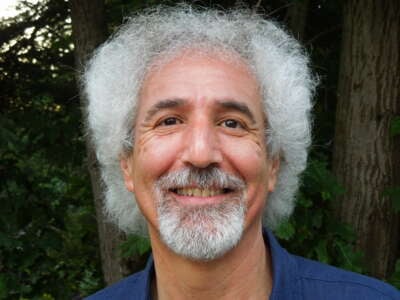
MICHEL MOUSHABECK is a Palestinian American writer, editor, translator and musician. He is the founder and publisher of Interlink Publishing, a 37-year-old Massachusetts-based independent publishing house. Follow him on Instagram: @ReadPalestine.











